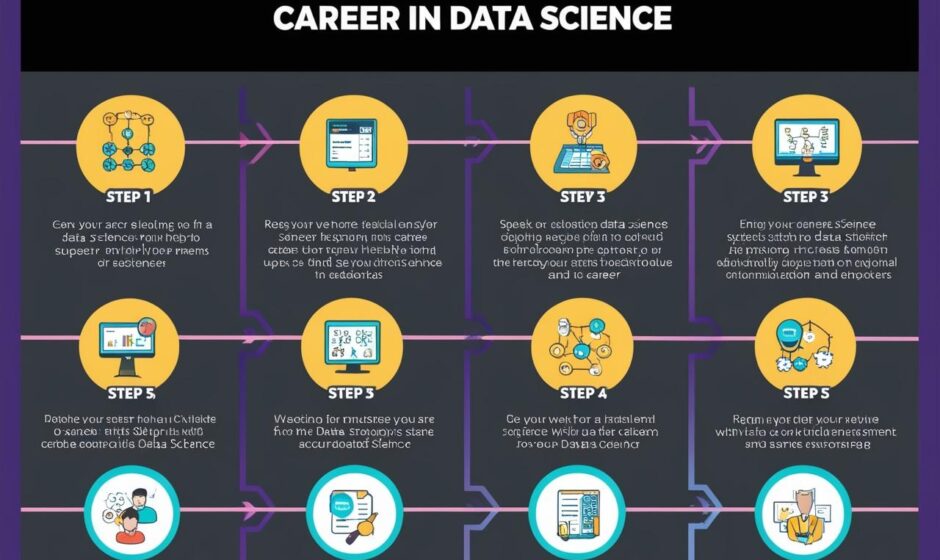In today’s digital era, data has become the new oil. Companies around the world are investing heavily in data-driven strategies to stay ahead of the competition. As a result, the demand for data scientists has skyrocketed. If you are curious about how to start a career in data science, you’re in the right place. This guide offers a comprehensive roadmap to help you kickstart a successful data science career, whether you’re a student, a working professional, or someone switching fields.
What is Data Science?
Before diving into the field, it’s essential to understand what data science entails. Data science is an interdisciplinary field that uses scientific methods, algorithms, and systems to extract insights from structured and unstructured data. It combines knowledge from statistics, mathematics, computer science, and domain expertise.
Key Components of Data Science:
- Data Collection
- Data Cleaning and Preprocessing
- Data Analysis and Interpretation
- Model Building and Evaluation
- Data Visualization
- Deployment and Monitoring
Understanding these areas will help you grasp what roles and responsibilities are involved in a typical data science job.
Develop the Right Mindset
A career in data science requires more than just technical skills. It demands a problem-solving mindset, curiosity, patience, and the ability to think analytically. You’ll often work with incomplete or messy data and need to make sense of it to deliver value.
Traits of a Successful Data Scientist:
- Analytical Thinking
- Curiosity
- Communication Skills
- Business Acumen
- Collaboration and Teamwork
Learn the Essential Skills and Tools
To become a data scientist, you need to master a variety of technical skills. Here are some core areas to focus on:
Programming Languages:
- Python: Widely used for its simplicity and extensive libraries like Pandas, NumPy, Scikit-learn, and TensorFlow.
- R: Preferred for statistical analysis and data visualization.
Mathematics and Statistics:
- Probability
- Linear Algebra
- Calculus
- Hypothesis Testing
- Descriptive and Inferential Statistics
Data Manipulation and Analysis:
- SQL for querying databases
- Excel for quick data operations
Data Visualization Tools:
- Tableau
- Power BI
- Matplotlib and Seaborn (Python)
Machine Learning:
- Supervised and Unsupervised Learning
- Decision Trees, Random Forests, SVMs, etc.
Big Data Technologies: (Advanced Stage)
- Hadoop
- Spark
- Kafka
Start with foundational skills and gradually move toward advanced topics.
Choose a Learning Path That Works for You
There are several ways to gain knowledge in data science. Choose one that suits your current lifestyle, goals, and learning preferences.
Options Include:
- Online Courses and MOOCs: Platforms like Coursera, edX, Udacity, and DataCamp offer structured programs.
- University Degrees: A formal education in computer science, statistics, or related fields.
- Bootcamps and Certifications: Fast-paced and focused, ideal for quick upskilling.
- Self-Learning: Through books, YouTube tutorials, blogs, and real-world projects.
If you are in or near Delhi NCR, enrolling in a data science course in Noida, Delhi, Lucknow, Meerut, and other cities in India can offer hands-on training and mentorship.
Work on Real-World Projects
Theory alone isn’t enough. You need to apply your knowledge to real-world problems to truly understand data science. Projects help you build a strong portfolio that showcases your skills to potential employers.
Project Ideas:
- Predicting housing prices
- Customer segmentation for marketing
- Sentiment analysis from social media
- Fraud detection in banking
- Recommender systems for e-commerce
Use platforms like Kaggle to find datasets and participate in competitions.
Build a Strong Portfolio
A good portfolio can set you apart from other candidates. Include:
- GitHub repositories of your projects
- Jupyter Notebooks with code explanations
- Visualizations and dashboards
- Project descriptions with objectives, methods, and outcomes
Consider writing blog posts to explain your projects. This not only shows your expertise but also improves your communication skills.
Get Internships and Work Experience
Internships are a great way to gain hands-on experience and learn about real-world challenges. Apply for internships through:
- Naukri.com
- Company websites
- Career fairs and networking events
Even freelance projects or volunteering for NGOs can add value to your resume.
Prepare for Job Interviews
Data science interviews typically include:
- Technical Questions: Python, SQL, statistics, ML algorithms
- Case Studies: Business problems where you must define approach and solution
- Coding Tests: On platforms like HackerRank or Codility
- Behavioral Questions: Teamwork, challenges, project experience
Practice is key. Join mock interviews, solve problems on LeetCode, and review your fundamentals regularly.
Stay Updated with Industry Trends
The data science landscape is constantly evolving. New tools, technologies, and best practices emerge regularly. Stay informed by:
- Reading blogs (Towards Data Science, KDnuggets)
- Listening to podcasts
- Attending webinars and conferences
- Following thought leaders on LinkedIn and Twitter
Network and Join Communities
Building a network helps you stay motivated and learn faster. Join communities such as:
- Kaggle
- Reddit (r/datascience)
- LinkedIn Groups
- Meetup.com Data Science events
Participate in discussions, ask questions, and share your knowledge.
Apply for Jobs Strategically
Target roles that match your current skill level:
- Data Analyst
- Junior Data Scientist
- Business Analyst
Gradually, as your experience and expertise grow, you can aim for roles like:
- Data Scientist
- Machine Learning Engineer
- AI Specialist
Customize your resume and cover letter for each job. Highlight relevant projects and skills.
Consider Specialization
As you advance, you may want to specialize in a niche:
- Natural Language Processing (NLP)
- Computer Vision
- Time Series Analysis
- Deep Learning
Specialization increases your value and opens up unique job opportunities.
Conclusion
Starting a career in data science may seem daunting, but with a clear roadmap and consistent effort, it’s absolutely achievable. The key is to start small, keep learning, and apply your skills in meaningful ways. With the right blend of technical expertise, soft skills, and practical experience, you can build a rewarding career in data science.

